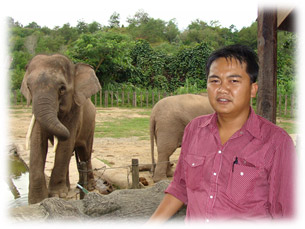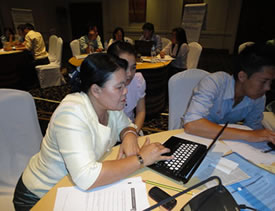
|

|
|
<< MID-BCC home page Blog Home ArchiveBy MonthJuly 2012 (2)June 2012 (1)May 2012 (3)April 2012 (5)March 2012 (1)By CountryCambodia (4)Lao PDR (4)Malaysia (1)Mozambique (1)Vietnam (2)By ProjectMID-BCC (9)PREVENT Project (3)
|
Blog Archives: MayMay 9, 2012-

First day all the workshop group from PREVENT is together in the same place – Fernando Garcia, David Zucker, Efua Orleans-Lindsay and Dee Bennett. We meet early to edit, re-order, rewrite, and translate presentation. This continued throughout the day and finalizedthe presentation’s materials, slides, and videos. More...
May 9, 2012-

My first trip to Sabah since vacationing there 15 years before, I found Sabah to be just as beautiful as I remembered it. But unlike my vacation visit in 1997, this time I planned to meet with the Sabah Wildlife Department in the hopes we might assist them in characterizing the human-wildlife interface and identify potentially risky behaviors that could allow transmission of zoonotic diseases from wildlife to people. More...
May 9, 2012-

Advocacy is a nuanced communication strategy and an important first step in creating behavior change among communities and organizations. Advocacy is well-developed and expertly executed in many countries and cultures, especially in the West. There are some cultures where it is not considered appropriate to advocate for a cause or an issue…and some governments look less kindly on non-governmental advocacy activities. More... |
|
|
Copyright© 2011 FHI360 1825 Connecticut Avenue NW Washington, DC 20009 - 5721 
The Mekong Infectious Disease Behavior Change and Communication Project is funded by the United States Agency for International Development (USAID)/Global Health under Client Associate Award Number GHN-A-00-09-00002-00 under Leader Award (C-Change) No. GPO-A -00-07-00004-00 and managed by FHI 360. The information provided on this site is the responsibility of FHI 360 and is not official information from the U.S. Government and does not represent the views or positions of USAID or the U.S. Government. |
||